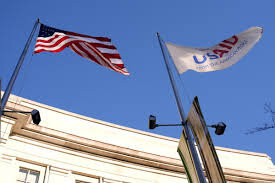What sort of hegemony is US counting on?
USAID cuts Lebanon’s share

BEIRUT — Trump’s issuance of an executive order to suspend funding for all projects funded by USAID has raised concerns among various Lebanese NGOs as it pays 22% of the total funding for the response plan in Lebanon.
For the year 2025, USAID had requested $72,245,000. Suspending it now would mean cutting funding for the UN World Food Programme (WFP) in Lebanon, to which USAID has allocated about $45 million. Thus, 170,000 Lebanese and 570,000 Syrian “refugees” will be cut off from aid provided by the WFP.
According to the US embassy in Beirut, USAID spent about $293 million in Lebanon, during 2024. USAID also participated in financing the Rapid Response Fund (RRF) with an amount of $128 million, representing 40.1% of the total amount paid to international organizations operating in Lebanon.
Trump decided to suspend most US foreign aid under the pretext of implementing a 3-month review to assess the extent to which this “aid” is consistent with the “America First” policy based on reducing foreign spending and spending it domestically.
Trump believes that it is possible to achieve the imperialist goals sought by these institutions without paying these amounts.
As a businessman, Trump believes that a single tweet can threaten a country like Colombia with raising customs tariffs and sanctions without the need to spend millions to exploit local NGOs to influence its official policy.
It is noteworthy that Trump excluded Egypt and the Israeli occupation entity. Between 1946 and 2022, the latter received about $317.9 billion in aid, while Egypt received about $182 billion.
To deal with the expected financial shortage, these Lebanese NGOs have rushed to lay off a large number of employees, noting that Trump’s decision will also have obvious repercussions on various projects funded by Washington in Lebanon.
As mentioned earlier, Trump’s decision will lead to the cessation of the activities of the WFP in Lebanon, which USAID allocated about 62.2% of the amount it needs, while 8 international agencies were to receive the remaining amount of $27 million.
Among these international agencies are: the International Organization for Migration (which was to receive $12 million); the World Health Organization (which was to receive $3.5 million).
Annually, the Asian continent tops the list of USAID funding with $20 billion, followed by Africa with $14 billion, which exposes the extent of Washington’s interest in its areas of imperial expansion.
Besides, the “global governance” sector receives about $16.8 billion annually from USAID, as “governance” is one of the tools that Washington uses to direct global economies towards neoliberalism.
The term “global governance” refers to the rules through which formal structures such as governments are directed, as well as informal structures such as NGOs.
During his first term (2017-2021), Trump sought to cut foreign aid budgets less radically than he has in his current term.
At the time, observers believed he was convinced that “imposing maximum sanctions on Iran” and toppling anti-American governments were of high priority.
Now, Trump claims that he will not base his decisions on the whims of the deep state in the US (the establishment), threatening to “exercise his authority to direct foreign policy.”
Seemingly, the neoliberal cultural globalist movement (close to the Democrats) is likely to bridge the gap.
Glenn Dessen, a Russian foreign policy professor, compares Biden’s policies and his successor Trump’s impact on global governance, noting that both share the goal of preserving the United States’ “unipolarity.”
“Biden sought to restore the US greatness through ideological alliance systems that fragment the world into regional blocs, bolster the loyalty of allies, and marginalize adversaries,” he states.
In contrast, “Trump seeks to withdraw from global governance institutions, which drain the US resources because he believes the alliance system is too costly and limits diplomatic freedom of maneuver.”
Glenn Desen warns that unipolarity “encourages other states to work collectively to diversify economic and military enterprises and develop new regional institutions of global governance.”
Leave a Comment